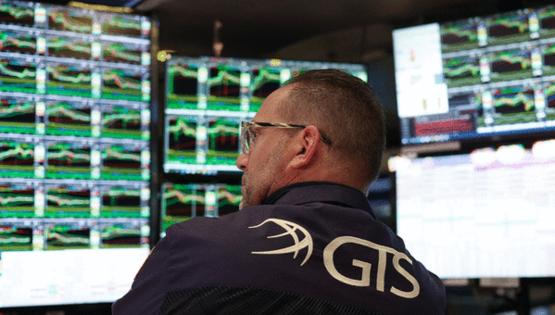Stock rally hits a wall as economic angst brews: Markets wrap
Published in Business News
A solid week on Wall Street is ending on a softer note, with stocks churning after one of the worst-ever consumer sentiment readings added to anxiety about the repercussions of President Donald Trump’s trade war.
Following a three-day rally, the S&P 500 wavered as data also showed long-term inflation expectations climbed to the highest since 1991. A mixed bag of corporate earnings brought little relief to investors skeptical about a timely resolution of the U.S. tariff spat with its top partners. Most equity industries dropped on Friday, though big tech gained after Alphabet’s solid results.
As investors digested conflicting signals on whether the U.S.-China trade spat is de-escalating, speculation grew that the world’s two largest economies won’t set aside their differences so quickly. Bonds and the dollar rose.
Trump told Time magazine he expects to wrap up trade deals with U.S. partners looking for lower tariffs in three to four weeks. But the president gave confusing signals about the status of talks with China, even as the Asian nation has denied negotiations are taking place.
Meantime, Bloomberg News reported that China is considering suspending its 125% tariff on some U.S. imports.
“We are currently in tariff purgatory,” said Joachim Klement, strategist at Panmure Liberum. “There is no fundamental change to the outlook, so markets latch on to noise and get constantly whipsawed by the ever-changing utterances of Donald Trump and his cabinet.”
Bank of America Corp. strategists led by Michael Hartnett said investors should sell into rallies in U.S. stocks and the dollar.
The greenback is in the midst of a longer-term depreciation while the shift away from U.S. assets has further to go, they noted. The trend would continue until the Federal Reserve starts cutting rates, the U.S. reaches a trade deal with China and consumer spending stays resilient.
Foreign investors have sold $63 billion of U.S. equities since the start of March, Goldman Sachs Group Inc. strategists estimate, noting that the data from high-frequency fund flows suggest that European investors have been driving the selling, while other regions have continued to buy U.S. stocks.
Forecasters anticipate the trade war will hit economic growth this year and next as tariffs push prices higher and put a dent in consumer spending.
The U.S. economy is set to expand 1.4% in 2025 and 1.5% in 2026, according to the latest Bloomberg survey of economists, compared with 2% and 1.9% in last month’s poll. The median respondent now sees a 45% chance of a downturn in the next 12 months, up from 30% in March.
Corporate Highlights:
—Apple Inc. is seeking to import most of the iPhones it sells in the U.S. from India by the end of next year, accelerating a shift beyond China to mitigate risks related to tariffs and geopolitical tensions.
—T-Mobile U.S. Inc. reported fewer new wireless phone subscribers than analysts expected in the first quarter.
—Colgate-Palmolive Co. cut its growth and profit outlooks as tariffs are expected to add $200 million in costs this year.
—AbbVie Inc. raised its profit outlook for the year on better-than-expected sales from newer autoimmune treatments.
—Centene Corp. raised its revenue guidance for the year because more people enrolled in its health insurance plans than it expected, a welcome sign for investors after the largest in the sector, UnitedHealth Group Inc. cut its forecast earlier this month.
Some of the main moves in markets:
Stocks
—The S&P 500 was little changed as of 10:59 a.m. New York time
—The Nasdaq 100 was little changed
—The Dow Jones Industrial Average fell 0.6%
—The Stoxx Europe 600 rose 0.3%
—The MSCI World Index was little changed
—Bloomberg Magnificent 7 Total Return Index rose 1.4%
—The Russell 2000 Index fell 0.8%
Currencies
—The Bloomberg Dollar Spot Index rose 0.2%
—The euro fell 0.2% to $1.1370
—The British pound fell 0.3% to $1.3308
—The Japanese yen fell 0.9% to 143.97 per dollar
Cryptocurrencies
—Bitcoin rose 2.2% to $95,481.39
—Ether rose 2.5% to $1,807.85
Bonds
—The yield on 10-year Treasuries declined three basis points to 4.28%
—Germany’s 10-year yield advanced three basis points to 2.48%
—Britain’s 10-year yield was little changed at 4.50%
Commodities
—West Texas Intermediate crude fell 0.6% to $62.43 a barrel
—Spot gold fell 2.1% to $3,277.97 an ounce
(With assistance from John Viljoen and Kit Rees.)
©2025 Bloomberg L.P. Visit bloomberg.com. Distributed by Tribune Content Agency, LLC.












Comments